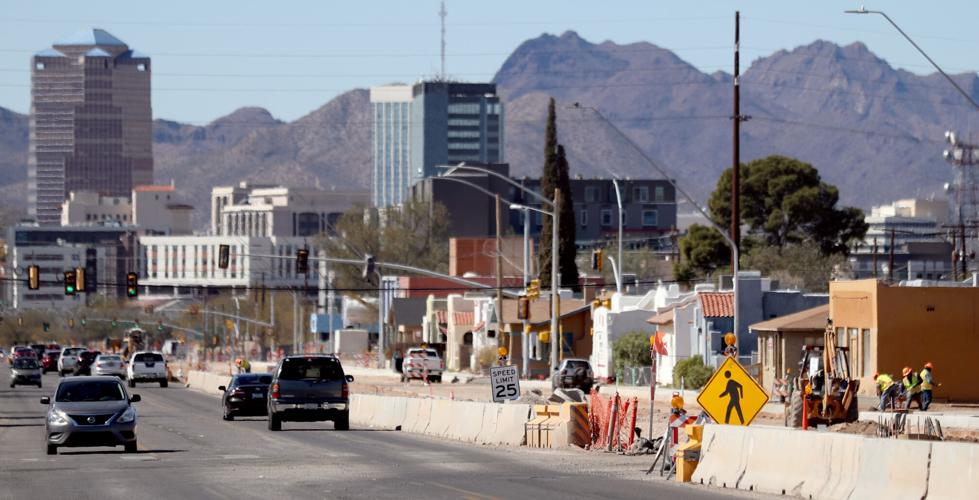A theme emerges in the responses whenever people question how the Pima Association of Governments or Regional Transportation Authority is operating.
Executive director Farhad Moghimi or board members supporting the status quo tend to use phrases like:
“State statute requires ...”
“The U.S. Department of Transportation demands ...”
“PAG’s bylaws have established ...”
What it all suggests is that the Tucson area’s two regional governing entities can’t really change because they are legally bound to continue operating just as they have been. The status quo must remain.
These phrases are coming up a lot lately, because for the first time in years, some of the government representatives on these overlapping entities are demanding change. The city of Tucson has been most strident, demanding weighted voting and an accounting of incomplete projects in the city, among other changes.
But it’s not the only government with representatives speaking up lately. As the Pima Association of Governments’ regional council prepares to meet Thursday, there are signs of cracks in the support for the status quo.
The Pima Association of Governments is a metropolitan planning organization with members from Pima County and all the municipalities and tribes in the Tucson area. The Regional Transportation Authority is a subdivision of PAG that administers the 2006 transportation plan and use of a half-cent sales tax, both of which were approved by area voters in 2006.
The stakes are especially high now because the authority is trying to get RTA Next off the ground. This would be a new transportation plan funded by a 20-year extension of the half-cent sales tax, which expires in 2026.
As the time gets tighter for establishing a new plan, tensions are rising. While RTA and PAG aren’t the same thing, many of the same key players are involved in both, and the issues that rise in one venue tend to wash over into the other.
On Thursday, Moghimi and the leaders of the regional board were expecting to approve PAG’s Overall Work Plan — essentially, a two-year budget. But it’s not on the agenda.
That’s because at a May 12 meeting of the management committee — the group made up of city and town managers, not elected officials — three members raised unusual protests.
Artemio Hoyos of the Pascua Yaqui Tribe confronted Moghimi about the lack of information presented to the committee about the $26 million in spending they were being asked to approve.
“My question is, what actual input was given by jurisdictions? What input did the Pascua Yaqui Tribe provide to the overall work program?” Hoyos asked. “We were given two presentations, last minute, but why in March, why in April, weren’t the other programs presented, so we could present questions.”
Moghimi responded that, in general, PAG offers details only on new programs, and he pulled rank by citing the Regional Council — the top governing committee consisting of top elected officials.
“The Overall Work Program is based on previous years. So a lot of the information you see in the Overall Work Program has already been underway by Regional Council action in previous years.”
Hoyos noted that two years ago, the work program was approved on a consent agenda — not discussed at all.
“I don’t intend to come to these meetings and stir the pot, “ Hoyos said, “but it just feels like we’re rubber-stamping numerous times — the Transportation Improvement Program, the Overall Work Program — without having that information in advance.
“I think there needs to be true jurisdictional input and transparency, where all of us get involved.”
Deputy Pima County Administrator Carmine DeBonis and Tucson City Manager Michael Ortega weighed in with similar criticisms. The committee then postponed approval, putting Moghimi and PAG in a bind, because the program must be approved by July 1.
It isn’t on Thursday’s agenda, but another unusual item is — a review of Moghimi’s performance. And so are some very specific instructions on how to deal with it.
Moghimi, who makes about $200,000 a year, last received a performance review in January 2019. His contract says he is supposed to be reviewed annually in January, but Mayor Regina Romero had to ask for it to be put on the agenda this time.
Marana Mayor Ed Honea, the chair of PAG’s Regional Council, sent an eight-paragraph memo to the members citing every legal authority he could and concluding:
“Regional Council’s performance review for the Executive Director must be based on statutory and fiduciary duties of the position and consistent with previously established Regional Council/RTA Board policies and directives.”
I asked Honea Tuesday why he sent the memo. He noted the city of Tucson’s apparent opposition to Moghimi.
“It’s not a popularity contest. The city may think they can either terminate or change Mr. Moghimi’s contract, but they can’t. They’re only one of nine.”
At Thursday’s meeting, the Regional Council will also pick a new chair, and Moghimi has nominated Sahuarita Mayor Tom Murphy. It’s a natural choice in that Murphy is treasurer now, but it is actually out of rotation when the years before 2020, when Murphy became treasurer, are taken into consideration.
A review of the chairs, year over year, shows that the Tohono O’odham Nation, Pima County or Tucson representatives would be taking over if a rotation had been followed in 2020.
But Murphy is poised to take the position that establishes meeting schedules and has some other powers. He is also a supporter of the status quo at PAG and RTA.
During an Arizona Daily Star editorial board meeting Tuesday, he warned change at PAG and RTA could harm the region.
“We’ve had a great successful model, and I don’t want to re-envision ourselves back to failure,” he said. “We had a very successful process before. I don’t think it is broken.”
At least it was a better argument for the status quo than saying we’re bound by law.
Plastic film and plastic bags should never go in curbside recycling. They can be recycled at most grocery stores instead. Video courtesy of Tucson Environmental Services.





